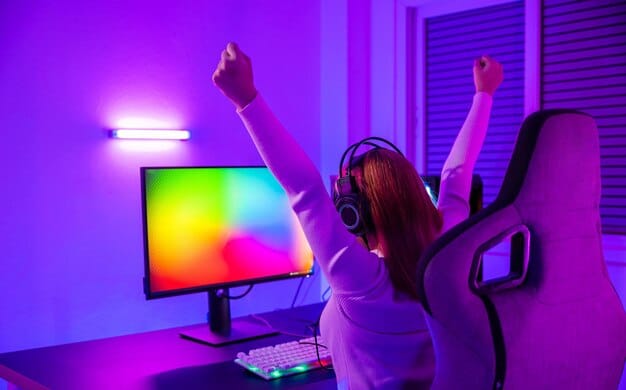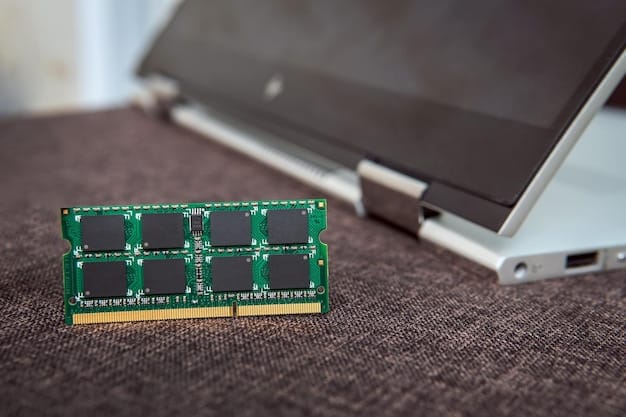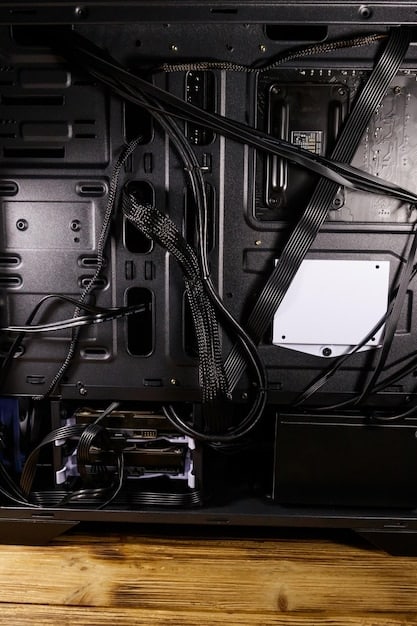Budget PC Gaming: Build a 1080p Rig Under $800 (Jan 2025)

Building a budget-friendly PC for 1080p gaming under $800 in January 2025 requires careful planning and component selection, balancing cost with performance to ensure a smooth and enjoyable gaming experience.
Looking to dive into PC Gaming on a Budget: Build a Powerful 1080p Rig for Under $800 in January 2025? It’s entirely possible to build a capable gaming PC without breaking the bank, even with the ever-evolving hardware landscape. We’ll guide you through selecting components, balancing performance, and staying within budget.
Choosing the Right Components for Budget Gaming
Selecting the right components is crucial when building a budget gaming PC. It’s about finding the sweet spot where cost and performance meet, ensuring you get the most bang for your buck. Each component plays a vital role in the overall gaming experience.
CPU (Central Processing Unit)
The CPU is the brain of your PC. For budget gaming, consider CPUs that offer a good balance between price and performance. Look for models with at least 4 cores and 8 threads to handle modern games effectively.
GPU (Graphics Processing Unit)
The GPU is the most important component for gaming. Aim for a GPU that can comfortably handle 1080p gaming at medium to high settings. Research benchmarks and reviews to find the best option within your budget.
- Consider AMD Radeon RX 6600: Offers excellent 1080p performance at a competitive price.
- Nvidia GeForce RTX 3050: A solid choice for ray tracing and DLSS at 1080p.
- Check Secondhand Market: You might find a good deal on a used but capable GPU.
Investing wisely in the CPU and GPU ensures a smoother gaming experience, balancing cost with the necessary power for modern titles.

Balancing Cost and Performance
Balancing cost and performance is the key to a successful budget gaming PC build. You need to identify areas where you can save money without significantly impacting performance. It’s all about making smart trade-offs.
RAM (Random Access Memory)
Aim for at least 16GB of RAM. This is the sweet spot for modern gaming, ensuring smooth performance and preventing bottlenecks. Look for a kit with a speed of at least 3200MHz.
Storage (SSD vs. HDD)
An SSD (Solid State Drive) is essential for fast boot times and quick game loading. A 500GB or 1TB SSD is a good starting point. You can add an HDD (Hard Disk Drive) later for additional storage.
- Prioritize SSD: Makes a noticeable difference in loading times.
- NVMe SSD: Offers even faster speeds compared to SATA SSDs.
- Consider Hybrid Approach: SSD for OS and games, HDD for mass storage.
Balancing RAM and storage options efficiently will enhance your gaming experience without overspending on unnecessary features.
Motherboard and PSU Considerations
The motherboard and PSU (Power Supply Unit) are often overlooked, but they are crucial for a stable and reliable gaming PC. Choosing the right ones can save you headaches down the road.
Choosing the Right Motherboard
Select a motherboard that is compatible with your CPU and has the features you need. Look for a model with good VRMs (Voltage Regulator Modules) to ensure stable power delivery. Also, check for sufficient PCIe slots and M.2 slots for future upgrades.
Power Supply Unit (PSU)
A reliable PSU is essential for powering your components safely. Choose a PSU with enough wattage to handle your system’s power requirements, with some headroom for future upgrades. Look for a PSU with an 80+ Bronze certification or higher for efficiency.
- Calculate Wattage: Use a PSU calculator to estimate your system’s power needs.
- 80+ Certification: Ensures efficiency and reduces heat output.
- Modular PSU: Makes cable management easier and improves airflow.
Selecting the motherboard and PSU carefully helps maintain system stability and provides a foundation for future upgrades, ensuring longevity and reliability.
Case and Cooling Solutions
The case and cooling solutions are important for protecting your components and maintaining optimal temperatures. A well-ventilated case and a good cooler can improve performance and extend the lifespan of your hardware.
Selecting a Case
Choose a case that is easy to work with and has good airflow. Look for a model with enough space for your components and features like cable management and dust filters. Consider the size of your motherboard and GPU when selecting a case.
Cooling Solutions
Effective cooling is crucial for preventing overheating and maintaining performance. A good CPU cooler is essential, and you may also want to consider adding case fans to improve airflow. Liquid coolers can offer better cooling performance but are typically more expensive.
- CPU Cooler: Choose a cooler that is compatible with your CPU socket.
- Case Fans: Improve airflow and reduce temperatures.
- Liquid Cooling: Consider an AIO (All-in-One) cooler for better performance.
Ensuring proper cooling and selecting a suitable case protects your components and helps maintain optimal performance, adding to the overall stability of your system.

Peripherals and Accessories
Peripherals and accessories are the final touches that complete your gaming setup. While they don’t directly impact performance, they can significantly enhance your gaming experience. It’s important to allocate a portion of your budget to these essential items.
Monitor
A good monitor is essential for enjoying your games. Look for a 1080p monitor with a refresh rate of at least 60Hz. Higher refresh rates and adaptive sync technologies like FreeSync or G-Sync can provide a smoother gaming experience.
Keyboard and Mouse
A comfortable keyboard and mouse are crucial for controlling your games. There are many budget-friendly options available that offer good performance and features. Consider mechanical keyboards for a more tactile and responsive feel.
Headset or Speakers
Good audio is essential for immersive gaming. Choose a headset or speakers that offer clear and balanced sound. A headset with a microphone is great for online gaming and communication.
- 1080p Monitor: Look for a monitor with a high refresh rate.
- Mechanical Keyboard: Offers a tactile and responsive feel.
- Gaming Headset: Provides immersive audio and clear communication.
Investing in quality peripherals and accessories completes your gaming setup, significantly enhancing your overall gaming experience.
Optimizing Your Build for the Future
Optimizing your build for the future means considering potential upgrades and ensuring your system is ready for newer games and technologies. Planning ahead can save you money and extend the lifespan of your gaming PC.
Upgradeability
Choose components that allow for future upgrades. A motherboard with extra PCIe slots and M.2 slots is a good starting point. A PSU with enough wattage headroom can also accommodate future upgrades.
Software Optimization
Keep your drivers up to date and optimize your game settings for the best performance. Overclocking your CPU and GPU can also provide a performance boost, but be sure to do it safely and monitor your temperatures.
- Driver Updates: Keep your GPU drivers up to date.
- Game Settings: Optimize settings for the best balance between visual quality and performance.
- Overclocking: Consider overclocking your CPU and GPU for a performance boost.
Planning for future upgrades and optimizing your software ensures your gaming PC remains competitive and enjoyable for years to come.
| Key Point 🔑 | Brief Description 📝 |
|---|---|
| 🎮 GPU Choice | Select a GPU like the RX 6600 or RTX 3050 for optimal 1080p gaming. |
| 💰 Balancing Act | Prioritize key components while making smart trade-offs to stay under budget. |
| 💾 Storage | Opt for an SSD for fast loading times, with an optional HDD for extra storage. |
| ⬆ Upgradeability | Choose components allowing for future upgrades to extend the PC’s lifespan. |
FAQ
▼
The AMD Radeon RX 6600 and Nvidia GeForce RTX 3050 are excellent choices for budget-friendly 1080p gaming. They offer a good balance of performance and price, allowing you to play most modern games at medium to high settings.
▼
16GB of RAM is the ideal amount for modern gaming. It ensures smooth performance and prevents bottlenecks, allowing you to run multiple applications in the background without impacting your gaming experience.
▼
Yes, an SSD is essential for fast boot times and quick game loading. It significantly improves the overall responsiveness of your system compared to a traditional HDD, making it a worthwhile investment.
▼
Choose a PSU with enough wattage to handle your system’s power requirements. An 80+ Bronze certified PSU or higher is recommended for efficiency. Use a PSU calculator to estimate wattage needs, and add some headroom for future upgrades.
▼
Effective cooling is crucial for preventing overheating and maintaining performance. A good CPU cooler is essential, and adding case fans can improve airflow. Proper cooling can extend the lifespan of your components.
Conclusion
Building a PC Gaming on a Budget: Build a Powerful 1080p Rig for Under $800 in January 2025 requires careful planning and component selection. By balancing cost and performance, you can create a capable gaming PC that delivers a smooth and enjoyable gaming experience. Remember to consider upgradeability and future-proof your system to ensure it remains competitive for years to come.